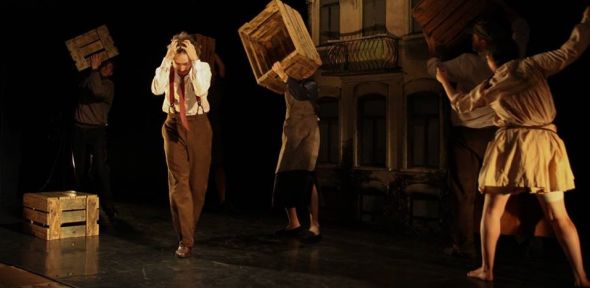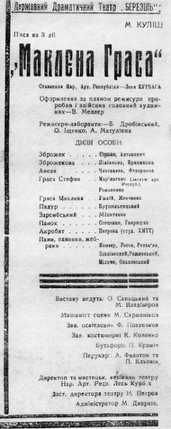
A brilliantly original and powerfully acted revival of Mykola Kulish’s controversial 1933 play Maklena Grasa is playing to packed houses in London.
Tonight Dr Rory Finnin, Director of Cambridge Ukrainian Studies and Head of the Slavonic Studies Section, joins Maria Montague and the Night Train Theatre Company team for a post-performance Q&A about the play’s historical context and the origins of this new production. Tickets are available here at the Camden People’s Theatre.
‘This full-length English-language production of Maklena is an inspiring grassroots act of artistic recovery of a Ukrainian dramatic work by British artists with a sensitive understanding of its origins,’ says Finnin, who is also Head of the Department of Slavonic Studies at Cambridge. ‘It represents nothing less than a watershed moment for the life of Ukrainian culture abroad.’

Maklena is the brainchild and labour of love of translator and director Maria Montague, who studied in the Cambridge Ukrainian Studies programme both as an undergraduate and a postgraduate. Cambridge Ukrainian Studies is partnering with Arts Council England to co-sponsor the production.
With Maklena, Montague and the Night Train Theatre Company are breathing new life into Maklena Grasa, which was written by Mykola Kulish and produced by the famous Berezil Theatre led by Les Kurbas. It centres on a thirteen year-old Polish girl named Maklena who dreams of life in the Soviet Union but struggles to distinguish reality from fantasy. Infamously, in September 1933, the play was performed at gunpoint before a crowd of Communist elites and agents of Stalin’s secret police. It was quickly banned; Kulish was later declared a ‘bourgeois-nationalist’ playwright and executed in 1937.
The play was effectively lost to the world for decades. Montague’s translation – which renders Kulish’s play into English for the first time – returns Maklena to us with an urgent sense of its contemporary currency.
Night Train’s production invigorates Kulish’s material with a searching musical score and fresh adaptations of the practices pioneered by Kurbas’s Berezil Theatre, including the integration of puppetry and human movement on stage.
Maklena marks the second theatrical collaboration between Cambridge Ukrainian Studies and Montague. Her verbatim play on the ongoing war in Donbas – The Summer Before Everything, co-authored with Cambridge's Bohdan Tokarskyi – premiered at the Junction in Cambridge and toured the United Kingdom in 2016.
'I am so excited to be working with Cambridge Ukrainian Studies to bring the first English translation of Maklena to the stage', said Montague. She credits Marta Jenkala, Cambridge's Lector in Ukrainian, for her steadfast support in navigating the complexities of the Ukrainian text.
'Since its launch in 2008, Cambridge Ukrainian Studies has sought to advance knowledge of Ukraine through innovative teaching, research and public outreach', said Finnin. ‘Night Train Theatre Company’s production of Maklena is a striking example of what can happen when talented and engaged students pursue their academic interest in Ukraine after university and channel it into new directions. The effect can be profound and lasting.’
Photo above by Tobias Baldauf





